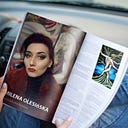Elaine de Kooning — Abstract Expressionism
Elaine Marie Catherine de Kooning (1918–1989) was an Abstract Expressionist and Figurative Expressionist painter in the post-World War II era. She wrote extensively on the art of the period and was an editorial associate for Art News magazine.
“Elaine de Kooning’s work in the southern Great Plains region between the 1950s and 1980s demonstrates that the artist achieved a hard-fought self-sufficiency, as she established her own regionally influenced style and subject matter. Inspired by the cowboy ethos and limitless horizons of the American West, de Kooning teamed with Texas-based dealer, Dord Fitz, who championed her art, promoting it to his students and patrons, and who worked with de Kooning to introduce many westerners to artistic abstraction. Challenging the more patriarchal, exclusive, and nationalist traditions endorsed by Clement Greenberg and Harold Rosenberg, de Kooning’s western production, much of which has been previously uncatalogued, exemplifies her performative, gender-based, inclusive approach to action painting. De Kooning’s Abstract Expressionist aesthetic complicates assumptions about the one-way power relationships between the dominant and marginalized, the geographical center and regional periphery, insisting on an accessible, polycentric view of modern art.”
